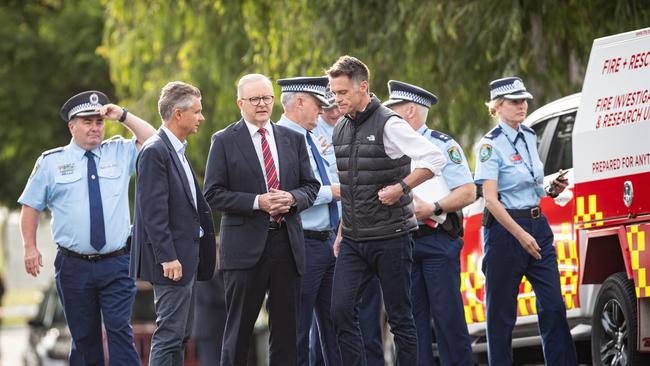
Warnings about the threat of a “powder keg about to explode” are linked to chronic workforce shortages and the ability of state police to manage myriad threats, including anti-Semitic attacks, soaring domestic violence incidents, cyber fraud and organised crime.
With about 7000 out of 65,000 police jobs across the country vacant, including more than 2000 in NSW, the risk of missing key intelligence and averting major incidents is real.
While NSW police officers do an extraordinary job protecting residents of Australia’s most populous state, there are serious concerns about personnel shortages and not having enough officers to shield everyone from harm.
The horrific surge in anti-Semitism this month has been met with force by NSW Premier Chris Minns, with police taskforces stood up quickly and expanded to hunt down offenders and restore peace for Jewish-Australians in Sydney.
The fear among some in police ranks is that the scourge of anti-Semitism will continue over months, requiring more resources to ensure patrols are in place and serious incidents are neutralised before the fact.
In response to nationwide police shortages, the Police Federation of Australia is finalising a federal election campaign in battleground seats to alert voters and politicians about extreme pressures its members are confronting. With public safety and crime now a top-tier election issue, the PFA will focus on retention and attrition rates, speedy access to medical support for officers, and incentives linked to salary sacrificing for mortgages and superannuation.
At a federal level, Anthony Albanese has come under enormous pressure to make arrests and lead the national effort to stop anti-Semitic attacks.
Many believe the establishment of the AFP’s Special Operation Avalite last month should have happened sooner and that Labor’s obsession with Islamophobia, Israel and UN votes has legitimised anti-Semitism among a minority.
Albanese, whose leadership as Prime Minister alongside senior Labor colleagues has been found wanting in response to anti-Semitism, is taking the wave of incidents in Sydney and Melbourne seriously.
With NSW and Victorian police claiming jurisdictional authority, the AFP has been working to support their investigations and hunt down offenders. While the NSW police and AFP historically have bumped heads, investigators are working together around the clock to neutralise threats. Following the firebombing of the Adass Israel Synagogue in Melbourne, Victoria Police joined with the AFP in launching Joint Counter Terrorism Team Strike Force Hilfield.
The AFP, which enforces commonwealth offences, primarily focuses on counter-terrorism, foreign interference, espionage, transnational serious organised crime, drug trafficking, the illicit tobacco black market, online child exploitation and cyber fraud.
The biggest challenge facing federal and state police investigators is the proliferation and increasing sophistication of criminals, terrorists, bikies and anti-Semitic offenders using encrypted communications.
The crooks are early adopters of encrypted communications. And social media and tech companies have made it harder for security agencies to crack. The rise of artificial intelligence and deepfakes is also adding time and complexity to investigations.
After previously attacking Scott Morrison over pandemic management, Albanese believes Australia should only have two tiers of government – federal and local.
Albanese was asked on the Straight Talk podcast this week whether it was a defect in Australia’s political processes that a leader can’t sign US-style executive orders in response to pandemics or anti-Semitism.
Albanese posed, hypothetically, that “if you were designing Australia again, I don’t think you’d have three tiers of government. My ideal would be two tiers – commonwealth government, a national government, and a regional government. But it is what is, you have to deal with it”.




Australia’s fight to eradicate anti-Semitism is undermined by frontline state and federal police being under-resourced, overworked and jurisdictionally hindered.